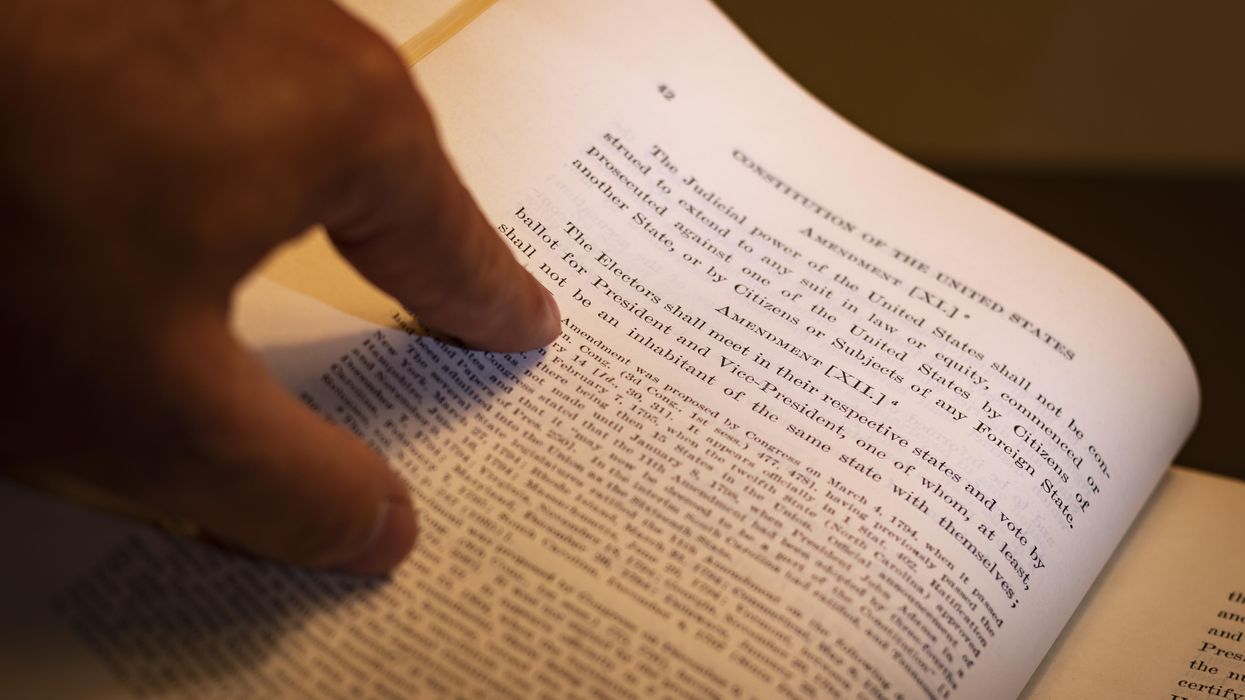Clements is the president of American Promise, a nonprofit advocate for amending the Constitution to allow more federal and state regulation of money in politics.
Let’s face it: To unite Americans and renew our democracy and republican form of government, we need to amend the Constitution — again.
Why should we expect any less? Every generation has had to do this.
Millions of Americans alive today participated in winning constitutional amendment campaigns. Those amendments ended the discriminatory and racist poll tax; gave District of Columbia residents the right to vote in presidential elections; enfranchised millions of young Americans who were “old enough to fight, old enough to vote;” and stabilized our government with a succession plan and provisions for an incapacitated president.
Not bad; four constitutional amendments in just a decade between 1961 and 1971. Boomers may get their share of criticism but this historic achievement can stand up to any generation’s accomplishments.
Perhaps they learned it from their grandparents. A generation earlier, Americans ratified four constitutional amendments between 1913 and 1920: voting rights for women; senators elected by the people; fundamental tax reform and, well OK, prohibition. Another amendment 10 years later ended prohibition.
Things must have been easier then, right? Americans and our politics must have been less divided, or there must have been some lost magic trick in the Constitution to make amendments more achievable. We can’t do that anymore, right?
No, none of that is true.
We are no more divided or challenged today than Americans after the Civil War, in the Gilded Age/Progressive Era or in the 1960s. Those were times of chaos, political violence, rapid technological change, challenges with mass immigration and racism, war, pandemic, political crisis, and dysfunction. Sound familiar?
So how did Americans secure democracy with constitutional amendments? No “dangerous” constitutional convention, no “civil war,” no drama. Just the common, dogged, heroic acts of every-day citizenship for Americans.
Learning, speaking out, talking with neighbors, organizing, voting and demanding that politicians vote for the persistent good idea that won’t go away.
That’s how constitutional amendments get the required two-thirds vote in Congress and ratification by three-quarters of the states. That’s the simple but challenging way Americans have advanced and preserved constitutional democracy for two centuries.
There are always skeptics who say it can’t be done. A few weeks ago, the New Yorker explained “ The United States’ Unamendable Constitution ” to its readers. Why is the Constitution unamendable, despite the clear and well-used amendment provisions?
The usual reasons, says the New Yorker: We haven’t done it in a long time, and we’re too divided. These are the same reasons the Washington Post gave in 1904 when it explained, just before a wave of four amendments, that the Constitution is “effectively unamendable.” Americans have ratified 12 amendments since then.
There’s no shortage of constitutional amendment proposals now. Dark money and election integrity? Term limits? Fiscal responsibility? Equal rights? Electoral College?
Which amendment has the most unifying support from all political viewpoints, is most likely to succeed, would have the most impact, and could possibly kick-start other constitutional reform, as happened in previous eras?
My bet is on the amendment to end the corruption of money in elections, and put voters instead of elite donors in charge. This proposal is real, has been vetted and has momentum.
It’s the For Our Freedom Amendment. It protects the First Amendment and empowers ‘we the people’ to enact effective rules about money in elections to protect free speech, representation, and election integrity for all Americans.
Just about every American knows that unlimited and unaccountable money in our elections is one of the biggest reasons for systemic corruption, non-stop misleading attack ads, terrible candidates, poor governance, lack of free speech for all but the wealthiest donors, civic distrust, and disconnection between voters and our government.
We can’t fix this without a constitutional amendment because the Supreme Court invented a theory that regulation or limits on money in elections violate free speech rights of those with unlimited money.
That’s not what the First Amendment meant for the first 200 years of America. It’s a “clever lawyer” theory that doesn’t make sense in the real world. But an activist Supreme Court simply decreed the new theory, struck down our anti-corruption laws, and opened the floodgates for money from billionaires, global corporations, big unions and even foreign interests.
Millions of Americans already are advancing the For Our Freedom Amendment with the simple, powerful civic actions that get constitutional amendments done.
They have volunteered, signed petitions, gathered ballot signatures, voted on resolutions, visited representatives, presented to Rotary Clubs and local Chambers of Commerce, written letters to the editor, shared or commented on social media, and set up tables at farmers’ markets or wherever Americans gather to discuss opportunities for change.
As a result, 22 states have formally demanded that Congress pass the amendment so the states can begin the ratification process. Hundreds of members of Congress support this approach. Polls and votes in state and local referenda show consistent supermajority support from three out of four Americans.
While skeptics continue to buy into the myth that our Constitution is unamendable, millions of Americans are actually getting it done. The nonpartisan organization American Promise is a good place to start (I volunteer as president of American Promise).
Lord knows, America is imperfect and we often fall short of the promise of liberty, equal rights and self-government. But we do believe in that promise. We are persistent. We don’t give up. And we act when the chips are down. That’s why the United States of America has one of the longest-living constitutions and democracies in the history of humanity.
The Constitution is how the government obtains the consent of the governed. If it is “unamendable” by the people, it’s game over. Let’s not end the game without taking our shot.




















